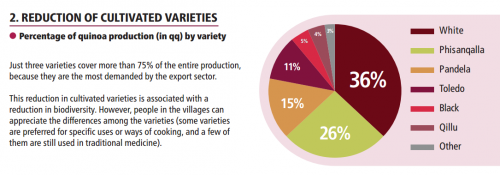Within the last decade, the grain quinoa has emerged as an alleged “super food” in western dietary practices. Health food stores and upscale grocery chains have aisles dedicated to varieties of quinoa, packaged under many different brand labels, touting it to be a nutritional goldmine. A simple Google search of the word returns pages of results with buzzwords like “healthiest,” “organic,” and “wholesome.” Vegan and health-enthusiast subcultures swear by this expensive food product, and the Food and Agricultural Organization (FAO) even declared the year 2013 International Year of the Quinoa, owing to the grain’s popularity.
The journey of the grain — as it makes it to the gourmet kitchen at upscale restaurants in countries like the United States — however, is often overlooked in mainstream discourse. It often begins in the Yellow Andes region of Bolivia, where the farmers that grow this crop have depended on it as almost a sole nutritional source for decades, if not centuries. The boom in western markets, with exceedingly high demands for this crop has caused it to transition from a traditional food crop to a major cash crop.
While critical global organizations like the FAO have been portraying this as positive, they tend to discount the challenge of participating in a demanding global market. Within-country inequality, skewed export/import dynamics, and capitalist trade practices that remain in the favor of the powerful player in these dynamics – the core consumer – cause new and difficult problems for Bolivian farmers, like not being able to afford to buy the food they have traditionally depended upon.
Meanwhile, growing such large amounts of quinoa has been degrading the Andean soil: even the FAO outlines concerns for biodiversity, while otherwise touting the phenomenon.
While efforts have been put in place by farmer unions, cooperatives and development initiatives to mitigate some negative effects on the primary producers of quinoa, they have not been enough to protect the food security of these Andean farmers. Increased consumer consciousness is therefore essential in ensuring that these farmers don’t continue to suffer because of Western dietary fads.
Cross-posted at Sociology Lens.
Aarushi Bhandari is a doctoral student at Stony Brook University interested in globalization and the impact of neoliberal policies on the developing world. She wants to study global food security within a global neoliberal framework and the world systems perspective.




Comments 8
Disqus_eh_um_saco — April 14, 2015
Not to dismiss soil degradation and other issues raised here but this seems like an incomplete picture of the situation. There's more demand for Quinoa, so where's the money for it going? Actual data for it, not speculation though. Has the life of people who planted it improved in any other way? What about information on the actual problem of food security for andeans who relied on it?
physioproffe — April 14, 2015
I've never understood how quinoa got so popular. It tastes like ass
Suspicious Anthropologist — April 14, 2015
Here is a bit more expansive discussion of the subject, which addresses some of the issues in the post and in the reader comments.
http://www.slate.com/articles/life/food/2013/01/quinoa_bad_for_bolivian_and_peruvian_farmers_ignore_the_media_hand_wringing.single.html
Ed Olaechea — April 16, 2015
This recent boost in quinoa demand has resulted in a dramatic expansion in its cultivation area. Claims have raised as most of this quinoa being grown in the highlands of Peru and Bolivia is going away to feed new markets, leaving few remaining for their requirements. The truth is that short time before quinoa became trendy, it production was limited to a few remote regions in southern Andes of these countries. However, producers cannot deny that quinoa has brought them a new profitable alternative for adding value to their farmlands, and have brought social and economic development in the region.
The Mother Grain — April 17, 2015
While I don't discredit stats, crunching numbers doesn't always tell the full story, or paint a complete picture. I've met farmers, who for the first time in their lives have real economic empowerment, who can now make real choices over their lives. Like sending their children to school or even college. Now they have the ability to diversify their diets, who are we to tell them, what to eat. I could go on and on by will simply and shamelessly plug our documentary...http://www.imdb.com/title/tt3541796/?ref_=ttmd_md_nm
Maximilian Hohenzollern — January 17, 2023
I think it's great that farmers have more options for profit, thanks to such practices. In general, many people have a lot of profitable options nowadays, but not everyone uses them. For instance, if you have access to the internet, you can just find a reliable broker on http://usforexbrokers.com/ and profit by trading, it's not that hard to learn all the basics, but for some reason, it's not as widespread as it could be.